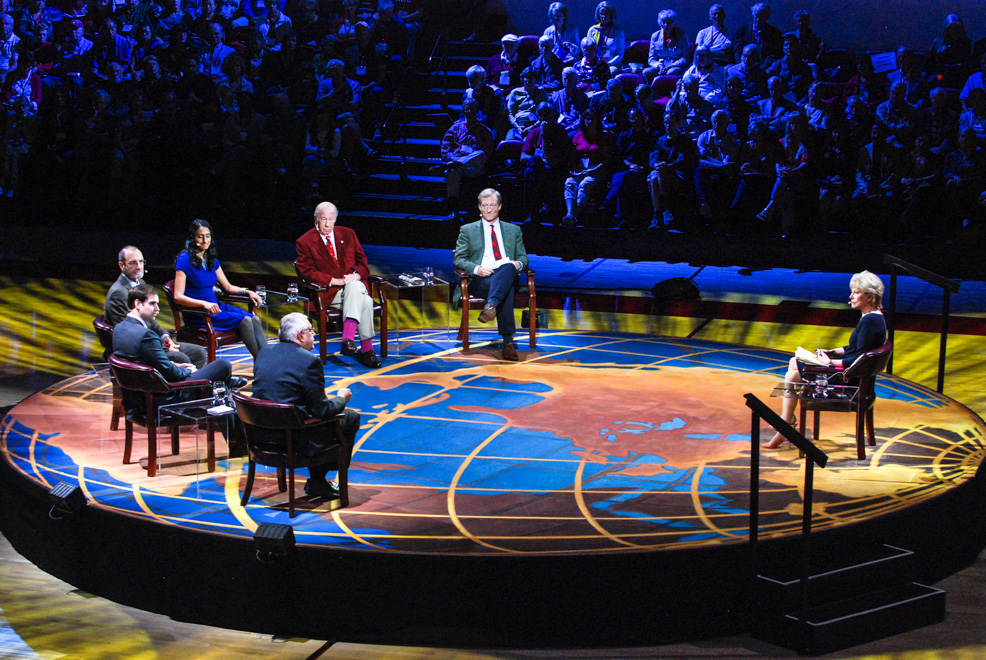
(RAHIM ULLAH/The Stanford Daily)
Raising the cost of water, taxing companies for the use of carbon and making global warming a more personal issue were some ideas to combat society’s indifference towards climate issues discussed in this year’s Roundtable.
“Twenty-five percent of kids in LA have asthma due to air pollution,” said Tom Steyer, philanthropist and founder of NextGen Climate, when discussing some of the ill effects of global warming.
Making climate change personal
Described as “the climate conversation you haven’t heard,” Stanford brought in the “rock stars of the environmental and energy sectors” for its annual Roundtable discussion, held in Maples Pavillion on Thursday morning. With climate change, the overall conversation has shifted from whether or not it’s because of humans to what we can do to actually fix the problem. Even though the majority of people understand that the issue is important, one of the bigger issues the panel tackled is the struggle of getting people to actually care.
“Two-thirds of Americans agree on the issue of climate change, but they don’t think it’s very important,” Steyer said. “When discussing climate change, we have to think local and we have to think human.” Citizens are more concerned with their own problems, their families and their local communities than the overall global climate, and the panel discussed ways to make the issues of climate change more relatable.
“People don’t make decisions based on global average temperatures, but what’s actually happening in their communities,” said Bina Venkataraman, director of global policy initiatives of the Board Institute of MIT and Harvard.
Society’s current bystander status has lead to an overall indifference toward climate issues and a common sentiment to “deal with it later.”
A growing sense of urgency
Global warming is as important of an issue as ever, with a recent study saying there may be “40 percent more rapid warming than we just recently understood,” according to Field.
Greenland is very much feeling the effects.
“Greenland’s way of life has always involved ice,” said Lesley Stahl, moderator and correspondent for 60 Minutes. “And now there’s no ice, but they’re finding oil.”
“Who owns the atmosphere? It’s not the government; it’s citizens.” said Alvaro Umaña, former minister of Costa Rica’s Energy and Environment government branch. “No one is standing up for the atmosphere.”
“The most challenging aspect of the climate problem is the urgency and consequence of delaying action,” said Chris Field, professor at Stanford and director of the Carnegie Institution’s Department of Global Ecology. “The longer we wait, the more it costs and the more solutions become complex.”
“I’ve been working in this area for 40 years and haven’t seen much progress, so it’s frustrating,” Umaña said. “We can do small things right away that will be very effective.”
Umaña recalled his work in Costa Rica, where a series of small changes has resulted in renewable energy sources that produce 90 percent of the overall electricity generated.
“We have to start acting because everyone else is going to start acting,” Umaña said. Umaña was disappointed with Apple for not leading the charge for companies to be more environmentally aware, but they have instead made the iPhone 6 leave a larger carbon footprint than the iPhone 5. “No company wants to be first or last.”
“There are nine companies in the world that generate two-thirds of all global emissions,” Umaña said. Companies should be held accountable for the carbon they use, the panel agreed, and believed that a tax on carbon is a way to ensure this.
“Let’s put a tax on carbon and make it revenue neutral,” said George Shultz, former Secretary of State and distinguished fellow at Stanford’s Hoover Institution. “The people producing carbon are imposing a cost on society.”
“The polluter should pay for the pollution,” Steyer said, leading to one of the loudest applauses from the audience that morning.
Regulating personal water usage
The current state of the climate has lead to issues with water, such as California’s drought, and citizens should be held accountable for their water use as well.
“We all think of water as a common resource that we have an absolute right to,” Steyer said. Even with the drought, many people still water their lawns and use excessive of water in their homes, as the water bill for many wealthy homes is so minimal that it’s irrelevant.
“Water is also an issue of equity,” Venkataraman said. “Residents in Hillsborough use three times as much water as residents in East Palo Alto.” Raising the price of water seemed like the answer, the panel agreed, but they understood the limitations and potential concerns.
“We all need water to survive, and pricing it at a level where people can’t get the water they need is something we can’t do,” Steyer said.
Moving forward
Even after a morning detailing how climate issues were not being addressed, the panel remained optimistic for the future, knowing that many innovators are looking towards the future and am working on technologies to combat global warming.
“I strongly believe that our ability to solve climate change from a technical standpoint absolutely exists,” Steyer said.
The event closed by putting the issues at the hands of a full crowd of Stanford alums, many of whom are in a place to make change happen.
“All the great ideas start with academics discussing the issue and moving out from there,” Stahl said.
Contact Jeremy Quach at jquach ‘at’ stanford.edu.
